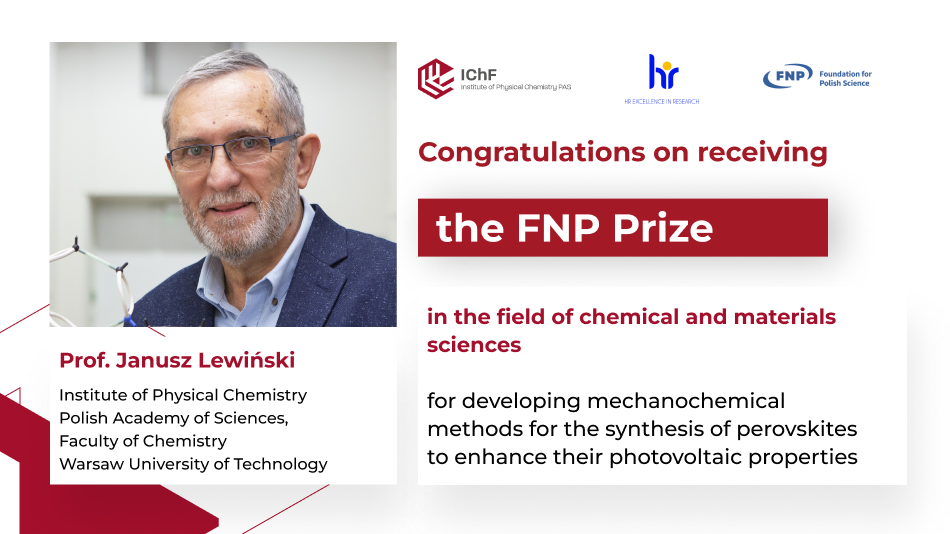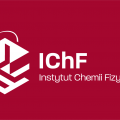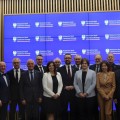Prof. Janusz Lewiński receives the prestigious Foundation for Polish Science Award
Reading time: about 7 minuts

In October 2024, Prof. Janusz Lewiński of the Institute of Physical Chemistry of the Polish Academy of Sciences and the Faculty of Chemistry of the Warsaw University of Technology received the Foundation for Polish Science 2024 Award in the area of chemical and material sciences.
This award, one of Poland's most distinguished scientific honors, recognizes Prof. Lewiński's pioneering work in mechanochemical synthesis of metal halide perovskites, which enhances their photovoltaic properties. These materials have emerged as a class of most promising and cost-effective semiconductor materials with unique properties, which enable a broad range of photovoltaic and optoelectronic applications. Solvent-free mechanochemical ball-milling of precursor salts is a promising route for the synthesis of a vast array of halide perovskites in a fast manner.
"This is a particularly special day for me and my former and current students, doctoral students and collaborators. This is a great honor, and I am pleased that the Foundation for Polish Science has recognized the pioneering nature of our research and contributions to the chemistry of metal halide perovskites, materials that have emerged as the most promising basic component for the next generation of solar cells. What's more, photovoltaic devices based on mechanoperovskites have higher efficiency compared to those using perovskite materials obtained by the classical wet method. It is no coincidence that mechanochemistry was included in the list of “10 innovations that will change the world” announced by the International Union of Pure and Applied Chemistry (IUPAC). I would also like to emphasize that today I would not be in this place and we would not have achieved so much in the research conducted by my teams without the support of the Institute of Physical Chemistry, Polish Academy of Sciences," highlights Prof. J. Lewiński.
Janusz Lewiński was born in 1956. In 1989, he received his doctorate in chemistry from the Faculty of Chemistry at the Warsaw University of Technology (FCh WUT). In the same unit, he defended his habilitation thesis in 2001, and then obtained the title of professor of chemical sciences in 2007. Since 2014, he has been the head of Department of Organometallic Chemistry and Catalysis at FCh WUT. Meanwhile, since 2008, he has also been employed at the Institute of Physical Chemistry of the Polish Academy of Sciences (IChF), where he heads the “Coordinating Complexes and Functional Materials” Group. Prof. Lewiński's scientific formation was greatly influenced by hisresearch stays at leading European and American universities, such as the University of Amsterdam (Netherlands), Rice University in Houston (United States), the University of Göttingen (Germany), the University of Cambrigde (United Kingdom), the Commissariat for Atomic Energy and Alternative Energies (CEA) in Grenoble (France) and the Federal Polytechnic of Lausanne (Switzerland). With the last three research centers, he continues intensive scientific cooperation to this day.
Prof. Lewiński is the author of over 190 articles and book chapters, including many papers published in the most prestigious journals, such as: Angewandte Chemie, Journal of the American Chemical Society, Chemical Science, Advanced Functional Materials, and Energy and Environmental Materials. His research work has been honored with numerous awards, including the Award of the Secretary of Science of the Polish Academy of Sciences (1989), the Kemula Award of the Polish Chemical Society (2000), the Maria Sklodowska-Curie Award of the Polish Academy of Sciences, (2008), CNRS-Université de Rennes Medal (2008), Team Award of the Minister of Science (2010), Scientific Award of the Rector of the Warsaw University of Technology (2011), and the Wojciech Świętosławski Award of the Polish Chemical Society (2023). In 2013 he was elected a member of the European Academy of Sciences, in 2015 he was honored with the title of Fellow of the Royal Society of Chemistry by the Royal Society of Chemistry, and in 2022 he was nominated as a Chemistry Europe Fellow.
Prof. Lewiński is also one of the pioneers of the revival of mechanochemistry as an extremely effective and environment friendly method of synthesizing chemical compounds and preparation of functional materials. Serving as the national coordinator for the European Union-funded program European Cooperation in Science and Technology (COST): Mechanochemistry for Sustainable Industry (Mech@SustInd), he contributed to the development of the mechanochemistry community both in Poland and Europe.
Prof. Janusz Lewiński co-directed two major EU projects (FP7 Noblesse and H2020 FET-Open GOTSolar), and was the leader of more than 20 scientific projects funded by major Polish research funding institutions: Foundation for Polish Science (including twice the TEAM project) and the National Science Center (including twice the MAESTRO grant). Prof. Lewiński skillfully combines basic and applied research, which is reflected in more than 20 patents he has authored or co-authored. In 2016, he founded Nanoxo, which develops the chemistry and technology of heavy metal-free quantum dots, and perovskite materials.
Prof. Janusz Lewiński's research is multidisciplinary in nature - his interests range from fundamental inorganic and organometallic chemistry to catalysis, chemistry and engineering of functional materials and nanomaterials, as well as nanotechnology. A distinctive feature of his team's research is the implementation of fundamental research at the molecular level into practical applications in the manufacture of functional materials.
The awardee's groundbreaking research conducted at IChF underscores our shared commitment to pushing the boundaries of knowledge and innovation. We are honored that four researchers from IChF have received the prestigious Awards of the Foundation for Polish Science.
Prof. Lewiński's selected key publications:
Mechanosynthesis of the hybrid perovskite CH3NH3PbI3: Characterization and the Corresponding Solar Cell Efficiency, Journal of Materials Chemistry A, 2015, 3, 20772; https://doi.org/10.1039/C5TA04904K
Mechanoperovskites for Photovoltaic Applications: Preparation, Characterization, and Device Fabrication, Accounts of Chemical Research, 2019, 52, 3233; https://doi.org/10.1021/acs.accounts.9b00454
High-Performance Perovskite Solar Cells with Zwitterion-Capped-ZnO Quantum Dots as Electron Transport Layer and NH4X (X = F, Cl, Br)–Assisted Interfacial Engineering, Energy & Environmental Materials, 2024, 7, e12720; https://doi.org/10.1002/eem2.12720
Unprecedented richness of temperature- and pressure-induced polymorphism in 1D lead iodide perovskite, Small, 2024, 20, 2403685; https://doi.org/10.1002/smll.202403685.
The Prize of the Foundation for Polish Science is an individual award. It is awarded by the Foundation Council through a competition. Laureates are selected from among candidates submitted by outstanding representatives of the scientific community, invited by name by the Council and the FNP Board. The award is given in four areas: life and earth sciences, chemical and material sciences, mathematical and physical sciences and engineering, and humanities and social sciences.
The FNP Prize has been awarded since 1992, and the group of winners, including this year's Prize winners, already includes 121 people. It includes such prominent scholars and scientists as Timothy Snyder, Karol Myśliwiec, Jerzy Szacki, Jan Strelau, Andrzej K. Tarkowski, Andrzej Szczeklik, Stanisław Konturek, Leszek Kaczmarek, Zofia Kielan-Jaworowska, Bohdan Paczyński, Tomasz Dietl, Ryszard Horodecki, Andrzej Udalski, Maciej Lewenstein, Krzysztof Matyjaszewski, Leon Gradoń, Marek Samoć, Marcin Drąg, Elżbieta Frąckowiak.
The award ceremony will take place on December 4, 2024 and will be broadcast on line.
In the current term, the Council consists of:
- Prof. Grażyna Jurkowlaniec, PhD hab. (University of Warsaw) - Chairman of the Council,
- Prof. Jacek Jemielity, PhD hab. (University of Warsaw) - Vice-chairman of the Council,
- Prof. Piotr Garstecki, PhD hab. (Institute of Physical Chemistry of the Polish Academy of Sciences, Warsaw),
- Prof. Jacek Jassem, PhD hab., MD (Medical University of Gdansk),
- Prof. Tomasz Łuczak, PhD hab. (A. Mickiewicz University of Poznan),
- Prof. Paweł Ostaszewski, PhD hab. (SWPS University),
- Prof. Zofia Szweykowska-Kulińska, PhD hab. (A. Mickiewicz University in Poznan).
We congratulate Prof. Lewiński on receiving this high honor.
FNP Prizes announcement: https://www.fnp.org.pl/en/nagrody-fundacji-na-rzecz-nauki-polskiej-2024-przyznane/. Source material: FNP (Polish version: https://www.fnp.org.pl/prof-dr-hab-inz-janusz-lewinski-laureat-nagrody-fnp-2024-w-obszarze-nauk-chemicznych-i-o-materialach/).
- Author: Dr Anna Przybyło-Józefowicz
- Photo source: Photo by Magdalena Wiśniewska-Krasińska, Archiwum Fundacji na rzecz Nauki Polskiej. Graphic: Władysław Żolik
- Date: 7.11.2024





